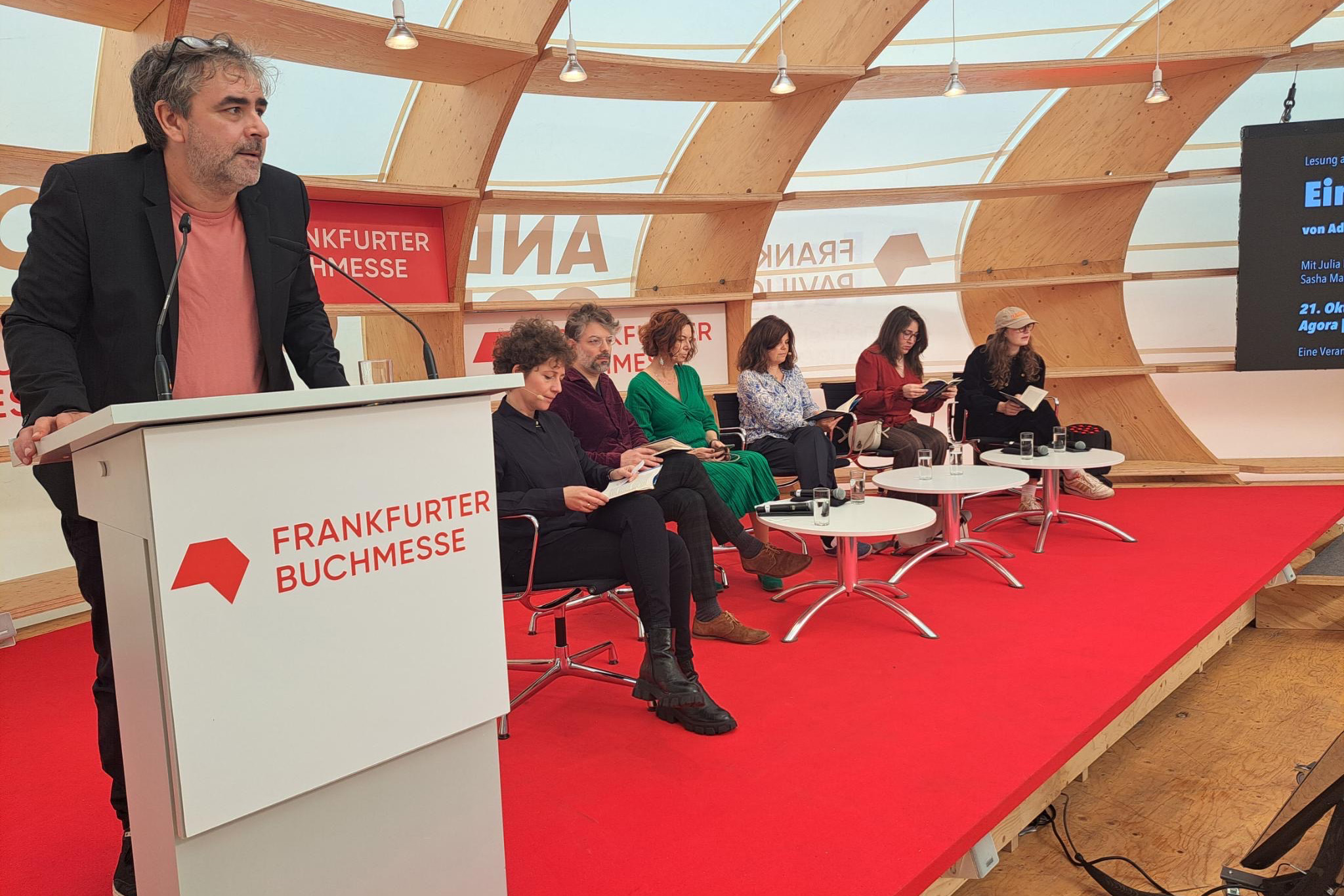Welcoming remarks at the reading from Adania Shibli’s ‘Minor Detail’
Frankfurt Book Fair, 21 October 2023
On solidarity, literature and debate
By Deniz Yücel

Good morning,
On behalf of the writers’ association PEN Berlin, I would like to welcome you to this reading from Adania Shibli’s novel »Minor Detail«. She was due to be awarded a prize for her novel at this year’s Frankfurt Book Fair, a ceremony which, as you know, did not happen.
I would like to thank Frankfurt Book Fair association for providing us with this stage, I would like to thank Deborah Feldman, Julia Franck, Tomer Dotan-Dreyfus, Sasha Marianna Salzmann, and Dana Vowinckel, who immediately accepted when my colleague Eva Menasse invited them to participate in this reading, and I’d like to thank you, the audience, for being here.
***
In August last year, when PEN Berlin had just been founded, we organized a solidarity reading at the Berliner Ensemble theatre following the assassination attempt on Salman Rushdie. Salman Rushdie, who will be awarded the Peace Prize of the German Book Trade tomorrow, has been threatened and persecuted for decades by the henchmen of the same Iranian regime that is believed to be responsible for the mass murder committed by Hamas in Israel on October 7.
One of the people who participated in this solidarity reading was Seyran Ateş, publicist, lawyer, and founding member of PEN Berlin. In recent days, it has emerged that an offshoot of the terrorist militia “Islamic State” was planning an attack against the progressive Ibn Rushd Goethe Mosque in Berlin, which was founded by Seyran Ateş. This news is both relieving, as the authorities were able to intervene in time, and frightening, as it reminds us once again that Islamist terror not only threatens Israel, but also remains a threat here in Germany – including, and especially, to Muslims or people from predominantly Muslim countries.
Unlike our reading for Salman Rushdie, today’s event is not a solidarity reading. I am not saying this on behalf of the participants, who may see things differently, but on behalf of PEN Berlin. And I probably need to explain:
It is precisely because solidarity with persecuted authors from all over the world is the primary reason for PEN Berlin’s existence that we use the term solidarity carefully. Solidarity does not only require personal commitment. Solidarity also requires the right occasion. It is necessary when someone has suffered a serious injustice, so grave and fundamental that others who otherwise have little in common with each other come together at this point and offer solidarity – symbolic, political, perhaps even practical.
Even before it was announced last Friday that the award ceremony for Adania Shibli would not take place as planned, we at PEN Berlin had spoken out against the looming postponement: “No book will be different, better, worse or more dangerous because the news situation changes. Either a book is award-worthy, or it is not. In my opinion, the jury’s decision in favor of Shibli, taken weeks ago, was an excellent choice. To withdraw the prize from her would be fundamentally wrong, both politically and literarily,” said our co-spokesperson Eva Menasse.
We still see it that way today. Of course we stand in solidarity with Adania Shibli if she is defamed or threatened. However, and I would like to emphasize this, there is no human right to a literary prize; a cancelled or postponed award ceremony is not a violation of human rights.
Today’s event is about two other things: literature and debate. We want to give a stage to the novel that has been the subject of so much discussion in recent days – and which, by the way, has been nominated for the American National Book Award and the International Booker Prize.
***
As PEN Berlin, we refute insinuations that Adania Shibli sympathizes in any way with the murderers of Hamas. However, we also do not share the view that Palestinian voices are not heard in Germany and that no one is interested in the suffering of the Palestinians.
In fact, since October 7, Palestinian voices have been quite vocal in Germany. Often – just think of the people handing out sweets in the streets of Berlin on the day of the attack – in an unbearable way; always radical, unforgiving.
What is missing, however, are Palestinian voices – intellectuals, artists, activists – who, of course, have a different perspective on the events in Israel and Palestine than, say, the culture or opinion editors of our major newspapers, but who do raise their voices for a peaceful co-existence of Israelis and Palestinians, for moderation and exchange, against hatred and violence. Who do not leave opinion leadership to the religious or secular radicals on the streets. There is no lack of the phrase “We distance ourselves”; what is missing is the admission that “We have a problem”. If only those Arab and Palestinian colleagues who have protested vehemently – and rightly! – in recent days against the cancellation of the award ceremony for Adania Shibli had also raised their voices in this spirit.
We can invite, perhaps even demand, that these Arab and Palestinian colleagues take responsibility and face up to this debate – just as we can call on the German public to conduct this necessary debate without generalizations and general suspicions. We cannot have this debate here and now, in this circle. But we can give literature its place, and that is what my colleagues are now going to do.
